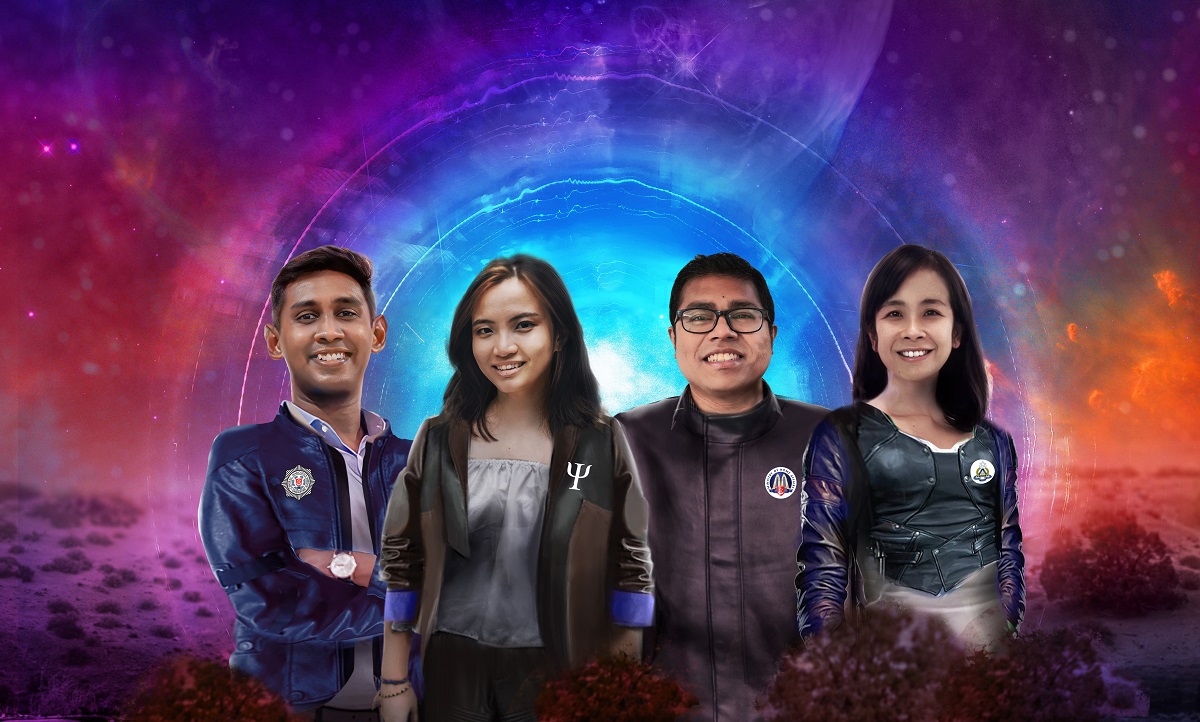BRANDED CONTENT
From drug-busting operations to rehabilitation: They're guardians of a drug-free Singapore
Meet the uniformed and civilian officers across the Ministry of Home Affairs (MHA) who have made it their lives’ work to combat the scourge of drugs

(Left to right) DSP Parthiban Mathevanan, Ms Teo Kah Shun, Mr Fazly Mohamed Jamaludin and SUPT (1A) Ng Kailin work together as one Home Team to keep Singapore drug-free. PHOTO: MINISTRY OF HOME AFFAIRS
Follow topic:
What started off as “just a taste” for Diane (not her real name) ended up sending the young woman into a downward spiral. Over the next 20 years, the “hardcore” drug user was in and out of drug rehabilitation centre and convicted of penal offences more than five times.
While under custody, she often engaged in aggressive and self-harm behaviours, even while pregnant. The prison officers at Institution A4, Singapore’s only female prison, did all they could to stabilise her behaviour and rehabilitate her. The officers never gave up on helping her, even though she kept returning to her old ways.
This is one of the harsh realities of drug addiction. The global and regional drug situation remains challenging, with shifting global attitudes toward more liberal drug control policies observed. Within ASEAN, some countries are reportedly looking to follow Thailand's footsteps and shift towards decriminalisation and legalisation of cannabis use.
We speak to four officers from the uniformed and civilian tracks at the Ministry of Home Affairs (MHA), who have made it their lives’ work to combat the scourge of drugs in Singapore together.
In Singapore, the number of drug abusers arrested in 2022 increased by 3 per cent from 2021, according to the Central Narcotics Bureau. There are also worrying trends of increased cannabis seizures and a growing number of new cannabis abusers below the age of 30 years, with some as young as 14. Some of the abusers were involved in drug trafficking.
While there is continued strong support from a very large majority of youths for Singapore’s drug-free approach and laws, recent surveys have shown that, fuelled in part by the “normalising” of abuse of cannabis in other parts of the world, a growing proportion of local youths may hold more permissive views on drugs.
SUPT (1A) Ng Kailin, 38
Deputy Director (Rehabilitation), Policy Development Division, MHA
a.k.a. Captain of Lives
Deputy Director (Rehabilitation), Policy Development Division, MHA
a.k.a. Captain of Lives
Ng Kailin, a recipient of the MHA Uniformed Scholarship (Singapore Prison Service) in 2003, was previously the Superintendent of Institution A4 where “Diane” was incarcerated. As part of her leadership development, she is currently seconded to the Ministry Headquarters as a Deputy Director at the Policy Development Division, where her team develops and enhances policies and laws for managing drugs and drug offenders.
Kailin works closely with the Central Narcotics Bureau (CNB) to make sense of current challenges and future threats, and to ensure that Singapore’s laws are robust and relevant to deal with these. One example is guarding against new psychoactive substances (NPS), which are substances that mimic the effects of controlled drugs such as cannabis, heroin and cocaine.
“NPS are proliferating at an unprecedented rate globally. We foresee that syndicates will continue to alter chemical structures of existing NPS to avoid detection, so we must augment our laws to allow swift enforcement against NPS,” Kailin explains.
Fighting drugs is close to her heart as she has met many people affected by it – abusers trying to kick the habit; their loved ones, especially young children left in the care of elderly grandparents and ex-addicts on their difficult journey of recovery.
“Nothing good comes out from taking drugs, even if it was just a ‘taste’,” Kailin says.
For the 38-year-old, the most satisfying part of her job is when ex-offenders break the cycle of crime and drug abuse.
“I was elated when Diane recently told me that she has stayed clean for more than a decade. She is currently running a home-based business and volunteers to help others stay drug-free. This motivates me to continue doing what I am doing to make a difference in the lives of others.”
DSP Parthiban Mathevanan, 34
Deputy Commanding Officer, Enforcement ‘G’ Division, Central Narcotics Bureau (CNB)
a.k.a. Drug Buster
Deputy Commanding Officer, Enforcement ‘G’ Division, Central Narcotics Bureau (CNB)
a.k.a. Drug Buster
Hitting the drug trade right at its source, and tackling both its demand and supply are key issues dealt by frontline drug busters like Deputy Commanding Officer Parthiban Mathevanan, at the CNB.
He leads a team which conducts operations targeting drug abusers and street-level traffickers, and investigates the suspects’ alleged drug activities. Parthiban finds meaning in his current role as he gets to work with like-minded team members towards achieving CNB’s mission – to Enforce, Educate and Engage for a drug-free Singapore.
He says: “I wanted to do a job that does not just contribute to a company’s bottom line, but betters society. I also didn’t see myself doing a mundane 9-to-5 office-based job, but one where I could always be on the go and have some excitement.”
Out in the community, Parthiban has been a strong advocate of CNB’s anti-drug message. In 2019, he was part of the agency’s Indian Community Outreach (ICO) Team which launched the campaign Bothaiporulai Ethirthu Nirpom (Tamil for “We Stand United Against Drugs”) for the Indian community.
Parthiban’s drug busting activities have extended beyond Singapore’s borders too. In 2020, he was posted to the International Cooperation and Partnerships Division in MHA HQ, where he worked on the World Health Organisation Expert Committee on Drug Dependence’s recommendations on cannabis and cannabis-related substances. He also had the opportunity to work closely with counterparts from other agencies such as the Ministry of Foreign Affairs, Ministry of Health, Attorney-General’s Chambers and Health Sciences Authority to assess and analyse the proposed recommendations.
Says Parthiban: “There is never a dull moment. Our work involves exciting operations and enforcement work, as well as important policy making and international engagements. The job, while demanding, has also developed me on a personal level – providing a dynamic and meaningful career. I feel excited to go to work every day.”
Ms Teo Kah Shun, 29
Psychologist, Central Narcotics Bureau
a.k.a. Systemic Hawkeye
Psychologist, Central Narcotics Bureau
a.k.a. Systemic Hawkeye
To break the cycle of drug abuse, psychologist Teo Kah Shun conducts drug risk assessments for first-time youth offenders. She is also involved in research projects that have enabled her to uncover more about the multi-faceted cause and impact of drug abuse, where biological, social and psychological factors come into play.
For example, the pleasurable feelings induced by the brain (biological) through the use of cigarettes is similar to drug use. Coupled with the presence of psychological factors, such as impulsive and risk-taking behaviour, and social factors, such as the type of friends that they socialise with, these factors could increase the risk of individuals using drugs.
To aid in the reintegration of former drug abusers, the 29-year-old developed the curriculum of the Community Supervision Skills course, which trains CNB officers to engage their drug supervisees more effectively. Through these sessions, officers’ capabilities are strengthened to better support their supervisees in reintegrating back into the community successfully.
“I feel heartened when supervisees benefit from the community referrals, or apply skills that they learnt,” she says.
Kah Shun also supports CNB’s recruitment effort by interpreting psychometric assessment and conducting interviews for personnel selection. She also holds counselling sessions and provides crisis support to ensure the well-being of officers.
She says: “In my daily work and projects, it is important to adopt a multi-systemic perspective to accurately assess youths (for their risks in drug reoffending) and personnel (for their suitability as CNB officers), as well as to support our officers in their drug enforcement and drug prevention work.
“Having a systemic perspective is also vital in understanding our stakeholders’ needs, so as to create useful and meaningful changes in the organisation. For example, through my research collaboration with various Home Team agencies, such as the Singapore Prison Service, we gained a better understanding about the behaviour and decision-making processes of drug offenders in order to craft more effective policies and messaging for prevention and rehabilitation.”
Mr Mohamed Fazly Mohamed Jamaludin, 41
Deputy Director (Southeast Asia & ASEAN), International Cooperation & Partnerships Division, MHA
a.k.a. Positivity-Man
Deputy Director (Southeast Asia & ASEAN), International Cooperation & Partnerships Division, MHA
a.k.a. Positivity-Man
Among a group of MHA Civilian Generalists tasked with spreading awareness about the dangers of drug abuse is Mohamed Fazly Mohamed Jamaludin, who is now Deputy Director (Southeast Asia & ASEAN) of the Ministry’s International Cooperation & Partnerships Division.
In his current role, Fazly helps to advance MHA’s security and safety interests through bilateral and multilateral engagements, and cultivating bilateral relations with countries in Southeast Asia to deepen cooperation on safety and security issues such as drugs.
Fazly sees his work as spreading the power of belief and positivity. For instance, in his interactions with former drug abusers, younger ex-abusers tend to worry about making ends meet or even relapsing due to social pressure. Fazly’s team works closely with them to render support and to encourage them to participate in aftercare programmes organised in the community. This helps them to build a positive mentality and the belief that they have the power to make a difference.
“It is heart-warming to see them grow in confidence as they overcome life’s challenges. Many also became motivated and wanted to give back to society by being mentors to their peers and guide them in their recovery journey,” he says.
In his earlier posting to the Policy Development Division and secondment to the Singapore Anti-Narcotics Association as Head (Advocacy, Corporate & Volunteer Management), Fazly worked closely with schools, youth groups and even former drug abusers to support national drug prevention efforts. He also took this one step further by sharing about Singapore’s approach towards drugs at international conferences, and how it keeps the drug situation under control.
One local initiative Fazly helped to kick-start was the Dadah Itu Haram campaign – a Malay-Muslim community-led anti-drug movement that involved youth volunteers. They visited popular youth hangouts, such as barber shops, eating establishments and mosques, to share the anti-drug message and to create awareness of the dangers of drugs.
Within a short period, the Dadah Itu Haram campaign received strong support from the community to display anti-drug collaterals in their premises
Fazly, who lost a close family member to drugs, says: “Drugs destroy lives and lead to serious social impact on families of drug abusers and the community. Like every parent, I wish for Singapore to be a drug-free society for my children and loved ones.”
Want to make an impact on Singapore and the lives of Singaporeans? The MHA awards Uniformed and Civilian Scholarships to all-rounded individuals who are pursuing their undergraduate studies and are passionate about strengthening Singapore’s safety and security. Jumpstart your leadership journey with us in one of these tracks:
- Uniformed Career:
- Singapore Police Force
- Singapore Civil Defence Force
- Immigration & Checkpoints Authority
- Singapore Prison Service
- Central Narcotic Bureau
- Civilian Career
- Generalist: Home Affairs Senior Executive
- Specialist: Commercial Affairs
- Specialist: Intelligence
- Specialist: Internal Security
- Specialist: Psychology
Apply via the Public Service Commission Gateway by March 15, 2023.


